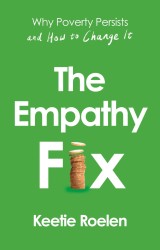Details

The Empathy Fix
Why Poverty Persists and How to Change it|
11,49 € |
|
| Verlag: | Allen & Unwin |
| Format: | EPUB |
| Veröffentl.: | 30.01.2025 |
| ISBN/EAN: | 9781805461760 |
| Sprache: | englisch |
| Anzahl Seiten: | 336 |
Dieses eBook enthält ein Wasserzeichen.
Beschreibungen
Poverty is something we all want to see less of. So why does it prove so difficult to tackle? Can empathy help fix it?
'An important and necessary book exploring the chronic empathy deficit around global poverty, offering surprising and compelling solutions to one of the greatest injustices of our time.' - Roman Krznaric
Poverty is bad for everyone. Being at the sharp end of disadvantage is shameful, reduces brainpower, and hampers positive action. It increases crime, burdens healthcare systems and raises taxpayers' bills. With millions around the world struggling to make ends meet and increased socioeconomic uncertainty making poverty a more probable prospect for many more, tackling poverty has never been more urgent.
Yet, while the ultra-rich bask in the glory of superstar status, people in poverty are cast as second-rate citizens. Deeply engrained prejudice and punitive policies lead to vicious cycles of deprivation. Positive psychology that emphasises personal strengths can be empowering for some, but also feeds toxic narratives of failure and defeat. The flipside of taking credit for individual success is that the inability to achieve it is attributed to personal shortcomings.
The Empathy Fix exposes the realities of poverty and reveals why policies don't work. It is a radical rethink of current efforts to tackle poverty, what it means and how we break the cycle. Here, writer and researcher Keetie Roelen provides readers with the tools to relate to poverty, realise why current interventions often don't work, and to respond to the situation in a way that gives everyone a sense of dignity and agency.
Through empathy, we can all contribute to a more equal society.
'An important and necessary book exploring the chronic empathy deficit around global poverty, offering surprising and compelling solutions to one of the greatest injustices of our time.' - Roman Krznaric
Poverty is bad for everyone. Being at the sharp end of disadvantage is shameful, reduces brainpower, and hampers positive action. It increases crime, burdens healthcare systems and raises taxpayers' bills. With millions around the world struggling to make ends meet and increased socioeconomic uncertainty making poverty a more probable prospect for many more, tackling poverty has never been more urgent.
Yet, while the ultra-rich bask in the glory of superstar status, people in poverty are cast as second-rate citizens. Deeply engrained prejudice and punitive policies lead to vicious cycles of deprivation. Positive psychology that emphasises personal strengths can be empowering for some, but also feeds toxic narratives of failure and defeat. The flipside of taking credit for individual success is that the inability to achieve it is attributed to personal shortcomings.
The Empathy Fix exposes the realities of poverty and reveals why policies don't work. It is a radical rethink of current efforts to tackle poverty, what it means and how we break the cycle. Here, writer and researcher Keetie Roelen provides readers with the tools to relate to poverty, realise why current interventions often don't work, and to respond to the situation in a way that gives everyone a sense of dignity and agency.
Through empathy, we can all contribute to a more equal society.
Keetie Roelen is a Senior Research Fellow and Co-Deputy Director of the Centre for the Study of Global Development at The Open University, UK. She has a PhD in Public Policy from the University of Maastricht in the Netherlands and has been working in the field of poverty, social policy, and international development for nearly two decades. She is also founder and host of the podcast Poverty Unpacked, a platform for exploring the hidden sides of poverty.
Her work has featured in media such as The Guardian and BBC World Service. She has spoken about how to address poverty to multiple audiences, ranging from government ministers and members of parliament to students and activists.
Her work has featured in media such as The Guardian and BBC World Service. She has spoken about how to address poverty to multiple audiences, ranging from government ministers and members of parliament to students and activists.

















